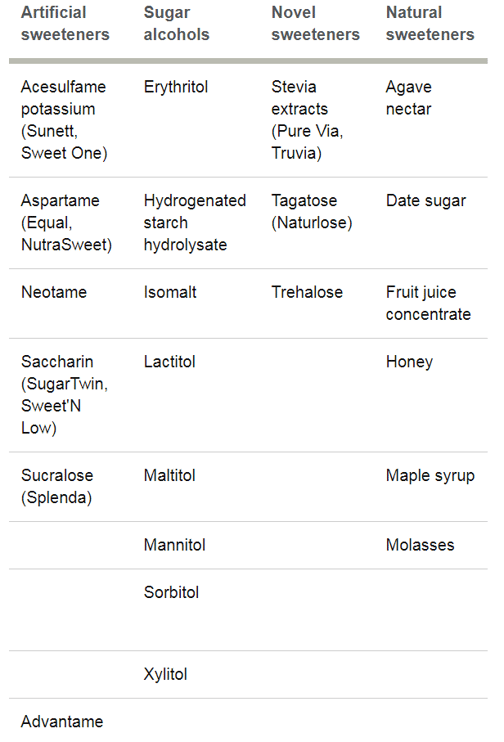 It's the start of a new year, which means new resolutions for many people. If your goals include eating healthier, then perhaps you're taking a serious look at how much your sugar intake is each day and figuring out how to cut back on it. Maybe you've decided to replace some of your favorite snacks or drinks with sugar-free or diet versions. Whatever your approach, it's important to stay informed.
It's the start of a new year, which means new resolutions for many people. If your goals include eating healthier, then perhaps you're taking a serious look at how much your sugar intake is each day and figuring out how to cut back on it. Maybe you've decided to replace some of your favorite snacks or drinks with sugar-free or diet versions. Whatever your approach, it's important to stay informed.
There's a lot of buzz about health concerns in regards to sugar and artificial sweeteners, and which is better for you. We've put together this list of pros and cons to help you make more informed decisions, but let's first talk about what an artificial sweetener is.
What exactly is an artificial sweetener?
In short, it's any sweetener you use instead of regular sugar. They're typically calorie-free, so many people use them as a way to reduce their sugar intake and save on calories. As noted by Harvard Health, there are five sweeteners that have been approved by the FDA:
- Saccharin
- Aspartame
- Neotame
- Sucralose
- Acesulfame
Stevia, a low-calorie natural sweetener, has also been approved. This chart by the Mayo Clinic lists the various brands that provide artificial and natural sweeteners:

So, are they good or bad?
Potential Benefits of Artificial Sweeteners
- Healthier Teeth. Sugar plays a major role in tooth decay and cavities. By substituting less sugar with artificial sweeteners, it's possible that you can reduce these effects on your teeth.
- Weight Loss/Control. Losing or maintaining weight is the biggest reason why people use artificial sweeteners. According to the Mayo Clinic, each gram of sugar contains 4 calories. So by substituting regular sugar with a calorie-free sweetener, you're able to reduce the amount of calories you have each day.
- Diabetes. For those with diabetes, eating too much (if any) sugar is a real concern. Artificial sweeteners are a good option as they do not raise blood sugar levels. It is important, however, to consult with your doctor on sugar alternatives.
If sweeteners can help keep your teeth healthy, control your weight, and be a good alternative to sugar for people with diabetes, what's with all the negative buzz about them not being good for you?
Potential Concerns of Artificial Sweeteners
- Calorie Replacement. Dr. David Ludwig, an obesity and weight loss expert at Boston's Children's Hospital, says the use of artificial sweeteners could cause people to make up for the lost calories in other ways that may not be healthy. For example, someone drinking a diet soda might go for a piece of cake since there are no calories in the soda.
- Change in Taste. A small amount of artificial sweetener produces a sweeter taste than the same amount of real sugar. "Overstimulation of sugar receptors from frequent use of these hyper-intense sweeteners may limit tolerance for more complex tastes," Dr. Ludwig says. Frequent use of these sweeteners can possibly lead sweet foods such as fruits and vegetables unappealing.
- Possible Weight Gain. A study conducted by the University of Texas - San Antonio suggests that artificial sweeteners could cause people to confuse sweetness with the amount of calories they consume. This may cause them to choose sweeter foods over healthier choices more often, which would lead to weight gain.
The claims that artificial sweeteners cause cancer have been a hot-topic issue for a long time, and mostly began due to studies from decades ago in which saccharin caused bladder cancer in laboratory rats. But the National Cancer Institute and other health agencies have found no scientific evidence that artificial sweeteners cause cancer or health problems. Sweeteners also have to be approved by the Food and Drug Administration (FDA).
Does this mean sugar is better?
Yes...and no. As Dr. Ludwig explained, sugar in its natural form such as whole fruit "tend to be highly nutritious." Meanwhile, processed sugar consumed in large quantities can have significant health impacts: diabetes, cardiovascular disease, and other chronic diseases can become a real concern.
What it boils down to is moderation. Indulging in sweets--whether made with real sugar or artificial sweeteners--on a constant basis can certainly have negative effects. But consumed in moderation, sweet and sugary foods can always serve as a tasty treat that you can enjoy.

